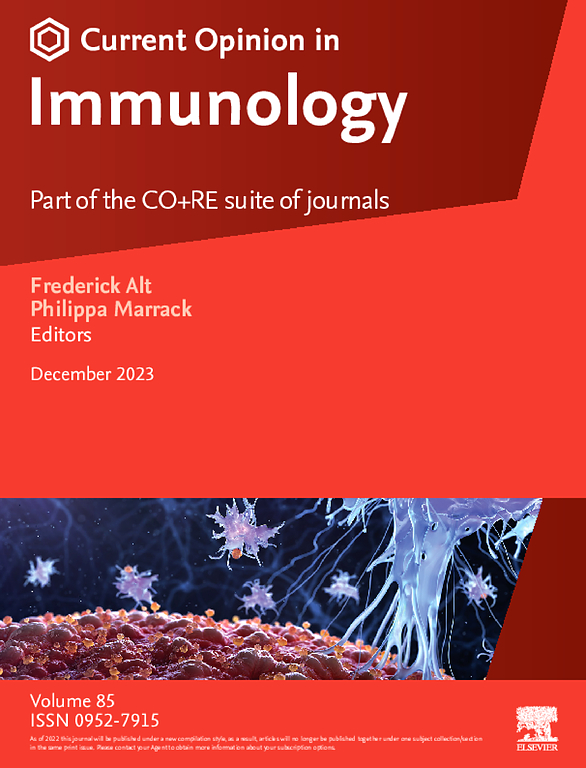HLA-B27作为治疗轴性脊柱炎的潜在靶点
IF 5.8
2区 医学
Q1 IMMUNOLOGY
引用次数: 0
摘要
轴性脊柱炎(axSpA)表现为炎症性背痛,主要在携带人类白细胞抗原(HLA)-B27等位基因的受试者中诊断。虽然在一般人群中不能诊断疾病或作为预测性生物标志物,但有令人信服的数据表明HLA-B27通过不同的促炎机制在axSpA中起致病作用。与其他慢性疾病类似,axSpA需要终身治疗,包括生物制剂和小分子,以治疗炎症,并最终通过实现持续的疾病缓解来阻止疾病进展。目前还没有治愈axSpA的方法,但一个引人入胜的论点是,基因疗法可能有逆转这种疾病的潜力。在此,我们对基因治疗策略的进展进行了全面和批判性的回顾,包括基因编辑技术、RNA干扰和病毒载体介导的递送系统,重点关注hla - b27相关机制的未来发展。了解这些新方法可能为更有效、个性化的治疗铺平道路,能够解决hla - b27阳性的axSpA难题。本文章由计算机程序翻译,如有差异,请以英文原文为准。
HLA-B27 as a potential target for the cure of axial spondyloarthritis
Axial spondyloarthritis (axSpA) manifests with inflammatory back pain and is diagnosed predominantly in subjects carrying the human leucocyte antigen (HLA)-B27 allele. While not diagnostic for the disease or a predictive biomarker in the general population, there is convincing data on the pathogenic role of HLA-B27 in axSpA via different proinflammatory mechanisms. Similar to other chronic conditions, axSpA requires lifelong treatments, including biologics and small molecules, to treat inflammation and ultimately halt disease progression by achieving sustained disease remission. There is currently no cure for axSpA, but one fascinating thesis is that gene therapy may hold the potential to reverse the disease. We provide herein a comprehensive and critical review of the advances in gene therapy strategies, including gene-editing techniques, RNA interference, and viral vector–mediated delivery systems, with a focus on the possible future developments in HLA-B27-related mechanisms. Understanding these novel approaches may pave the way for more effective, personalized treatments capable of solving the HLA-B27-positive axSpA conundrum.
求助全文
通过发布文献求助,成功后即可免费获取论文全文。
去求助
来源期刊
CiteScore
13.30
自引率
1.40%
发文量
94
审稿时长
67 days
期刊介绍:
Current Opinion in Immunology aims to stimulate scientifically grounded, interdisciplinary, multi-scale debate and exchange of ideas. It contains polished, concise and timely reviews and opinions, with particular emphasis on those articles published in the past two years. In addition to describing recent trends, the authors are encouraged to give their subjective opinion of the topics discussed.
In Current Opinion in Immunology we help the reader by providing in a systematic manner: 1. The views of experts on current advances in their field in a clear and readable form. 2. Evaluations of the most interesting papers, annotated by experts, from the great wealth of original publications.
Current Opinion in Immunology will serve as an invaluable source of information for researchers, lecturers, teachers, professionals, policy makers and students.
Current Opinion in Immunology builds on Elsevier''s reputation for excellence in scientific publishing and long-standing commitment to communicating reproducible biomedical research targeted at improving human health. It is a companion to the new Gold Open Access journal Current Research in Immunology and is part of the Current Opinion and Research(CO+RE) suite of journals. All CO+RE journals leverage the Current Opinion legacy-of editorial excellence, high-impact, and global reach-to ensure they are a widely read resource that is integral to scientists'' workflow.

 求助内容:
求助内容: 应助结果提醒方式:
应助结果提醒方式:


